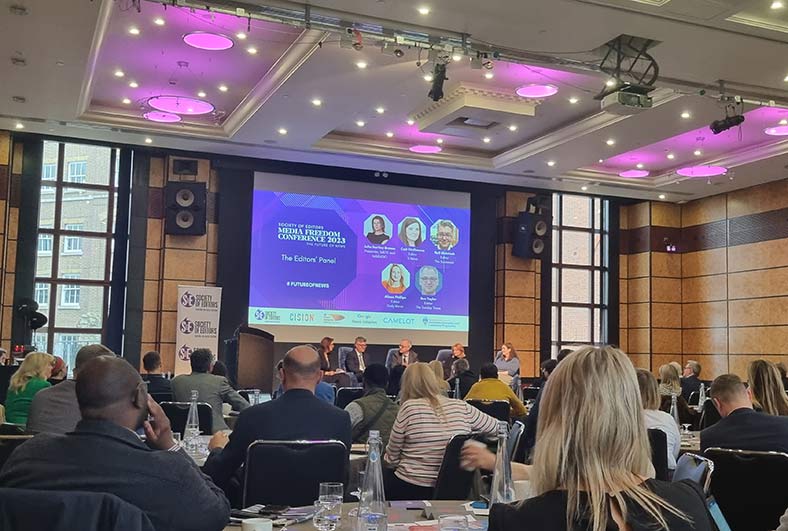Blog / Events / Journalists
An editor’s perspective on the journalism industry

In 2023, it is arguably harder than ever to be an editor, with smaller budgets, more competition and a rising number of people avoiding the news. At the Society of Editor’s Media Freedom Conference, the final panel of the day brought together four editors; Alison Phillips, editor-in-chief of the Daily Mirror, Ben Taylor, editor of the Sunday Times, Neil McIntosh, editor of the Scotsman, and Cait FitzSimons, editor of 5 News. They discussed current challenges, how they are adapting to modern pressures and what the future holds for their titles and the wider journalism industry.
Get a recap of some of the key points from the conference by reading our overview here.
The Challenges
The current economic climate means that most industries are struggling. Alison Phillips said that money is the biggest problem for journalism right now. Advertisers are being stolen by the likes of Google and Facebook. Plus, different forms of journalism can require more money. Investigative journalism can take up several weeks of work and often needs more investment but ultimately, might not come to fruition.
Alison also mentioned any SLAPPs (Strategic Lawsuits Against Public Participation) or litigation that publications might have to fight off and the need to have a conversation about whether it is something that they can afford to deal with. This was backed up by Ben Taylor, who feels that lawyers are increasingly trying to keep certain details out of the papers or from being broadcast on TV. Big companies or celebrities are spending more to keep information out of the media, even though it might be of public interest.
The other issue that Cait FitzSimons touched upon was access. 5 News is the smallest of the national broadcast newsrooms and therefore struggles to get the opportunities to speak to politicians or major figures, as they will prioritise larger providers like the BBC. That means that the 5 News team must take a different approach or ask questions that the other broadcasters are not. Stories can still be secured, but it has to be done in another way.
The Changes
These challenges, along with other issues such as news avoidance, have prompted publishers and papers to change. Neil McIntosh spoke about how The Scotsman has moved away from having general reporters and now focuses on specialisms. These journalists are tasked with looking at particular sectors such as the arts, rural affairs, and education. Allowing reporters to have a specialism means that they can dive deeper into a certain subject and hopefully produce better journalism as a result. Another advantage – the reader will know what content they will get from each journalist.
At the Sunday Times, Ben explained how the paper was moving away from ‘boring’ interviews with politicians that are full of sound bites. Back in the day, the papers would be full of press releases from the Government with responses from opposition leaders but readers aren’t interested in this anymore. They are now reading explanatory journalism, investigative journalism and stories that go behind the scenes. They want insight, analysis, and exclusives.
The Future
The strapline for the event was the #Futureofnews so each of the panelists offered up their thoughts on what might lie ahead for the industry. Alison said that audiences want quality trusted news. That was evidenced during Covid where traffic for newspapers, websites and broadcasters went up across the board. This shows that going forward, people do still want to be informed but news providers need to constantly change up the offering and make things less overwhelming by explaining the stories. Cait echoed this by saying companies would need to have flexibility and be aware of how and where people are taking their content from.
She went on to say that the future of news would be dependent on the audience trusting the news that is provided. Ben said the best way to do this was by taking accountability for mistakes. Plus, sharing the process by which the news is sourced for viewers and readers will help them to trust the media again and, in turn, drive more interest and engagement.
The advice for future and aspiring journalists from Neil was to remember that story is at the heart of every article and to learn all of the skills that are available to them. Ben stressed the importance of being a digital native while Alison said that having a specialism is important. Cat finished by urging aspiring journalists to bring their own perspective to the newsroom.